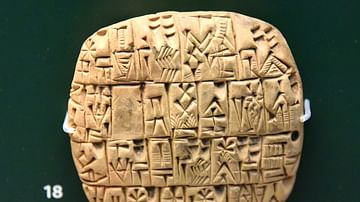Search
Did you mean: Empire?
Search Results

Article
The Portuguese Colonization of the Azores
The Azores (Açores) are a North Atlantic island group, which was uninhabited before being colonized by the Portuguese from 1439. The Azores were strategically important for Portuguese mariners to use as a stepping stone to progress down the...

Article
The Iberian Conquest of the Americas
European explorers began to probe the Western Hemisphere in the early 1500s, and they found to their utter amazement not only a huge landmass but also a world filled with several diverse and populous indigenous cultures. Among their most...

Article
Inca Mummies
The Inca civilization of Peru, as with many other ancient Andean cultures, mummified many of their dead and buried them with valuable materials such as precious metal jewellery, fine pottery, and sumptuous textiles. Important mummies could...

Article
Herodotus on the Egyptians
II:35. The Egyptians in agreement with their climate, which is unlike any other, and with the river, which shows a nature different from all other rivers, established for themselves manners and customs in a way opposite to other men in almost...

Article
Hymn to Nisaba
The Hymn to Nisaba (c. 3rd millennium BCE) is a poem praising Nisaba, the Sumerian goddess of writing and accounts who also served as scribe of the gods. The poem is officially dedicated to Enki, the god of wisdom (sometimes given as her...

Article
Roman Expeditions in Sub-Saharan Africa
Sub-Saharan Africa was explored by Roman expeditions between 19 BCE - 90 CE, most likely in an effort to locate the sources of valuable trade goods and establish routes to bring them to the seaports on the coast of North Africa, thereby minimizing...

Article
De-Ka-Nah-Wi-Da and Hiawatha
De-Ka-Nah-Wi-Da and Hiawatha is the written account of the oral history of the origins of the Haudenosaunee (Iroquois) Confederacy, detailing how the great peacemaker Dekanawida (De-Ka-Nah-Wi-Da) met Chief Hiawatha and established peace between...

Article
The Red Handprints of Cozumel & Tulum
The Maya sites of San Gervasio (on the island of Cozumel) and Tulum (on the mainland of Mexico in Quintana Roo) are often overlooked for the better-known Chichen Itza or other spectacular ruins further inland but both these locations have...

Article
In Darwin's Footsteps - Te Waimate Mission
The Bay of Islands is a subtropical region in New Zealand's far north and is a popular destination for big-game fishing, sailing, and dolphin watching. It is an area rich in the history of Maori (Māori in their own language) and European...

Interview
Interview: Gods of Thunder by Tim Pauketat
Join World History Encyclopedia as they chat with Tim Pauketat all about his new book Gods of Thunder: How Climate Change, Travel, and Spirituality Reshaped Precolonial America, published by Oxford University Press. Kelly: Thank you so much...